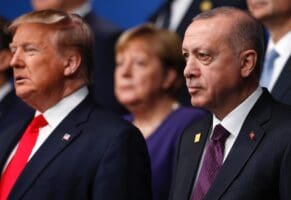It’s time for the US to stop alienating its allies
Turkey’s April 25 air strikes against Kurdistan Workers’ Party (PKK) positions in Iraq and its affiliate People’s Protection Units (YPG) in Syria were unexpected, but should not have surprised anyone.
Turkey has consistently maintained that the PKK’s presence in Iraq’s Sinjar region was unacceptable. Only two months into the Euphrates Shield Operation back in October 2016, President Recep Tayyip Erdogan pledged that Turkey would not tolerate Sinjar to be the “new Qandil”, referring to the terror group’s base of operations in northern Iraq.
While Turkish officials repeated their opposition to PKK’s presence in Sinjar several times, officials from the Kurdish Regional Government (KRG) also asked the PKK to leave the area.
Early in March 2017, clashes broke out between the PKK-linked Yazidi militia and the KRG’s Peshmerga fighters, a sign of increased tensions among Kurdish groups fuelled by the PKK’s lingering presence in the region.
Qandil mountains are located along the Iraq-Iran border in northeastern Iraq. The PKK have long been taking advantage of the mountainous terrain and using its bases there to train, plan attacks, and provide logistical support to its fighters. A similar base in Sinjar would help the PKK to operate in northwestern Iraq – an area near the Syrian border which is critically important for the fight against the Islamic State of Iraq and the Levant (ISIL, also known as ISIS). US military planners must be betting on the promises of the PKK-linked Sinjar Resistance Units to help cut off ISIL’s route between Mosul and Raqqa.
A strain on US-Turkey relations
Turkey is opposed to not only PKK’s influence in the region, but also the US’ apparent tactical decision to utilise the PKK against ISIL. Turkey prefers a combination of Peshmerga forces and Free Syrian Army fighters to take the lead in the fight against ISIL, as these groups pose no threat to Turkey’s national security.
The PKK, on the other hand, has not only continued to conduct attacks against Turkey but has also sought to establish an autonomous region in northern Syria through its Syrian affiliate, the Democratic Union Party, by making deals with prominent actors in Syria’s war, including Russia.
Creating a hub and a base for its operations in Sinjar is critical for the PKK, but actualisation of this plan would ironically violate the Iraqi-Syrian border – just like ISIL attempted to do in the past.
US military leaders seem to consider the PKK affiliates in Iraq and Syria as allies in the fight against ISIL.
The US Central Command went even further than that and is now reportedly patrolling the Syrian-Turkish border to discourage escalation and violence between two of its “most trusted partners in the fight to defeat ISIL”.
OPINION: US alliance with Syrian PYD alienates Turkey
The US military did not hide its displeasure with the Turkish air strikes against the PKK and its affiliates in Iraq and Syria despite the fact that the US and Turkey are supposed to be part of the same anti-ISIS coalition. At the same time, neither President Trump, nor US officials at the cabinet level, have made any statements against Turkish operations.
The forthcoming meeting between US President Donald Trump and his Turkish counterpart will surely involve extensive discussions around the US-Turkey strategic disconnect in the fight against ISIL and the PKK’s influence on the ground. It will be a challenge, however, to resolve this issue in one meeting.
Two sides will need to talk more often and in-depth about a military plan to root out ISIL but also, and more importantly, they will need to agree on a political plan that would establish stability on the ground in a post-ISIL scenario. Unfortunately, the anti-ISIL coalition’s efforts have been largely tactical and created space for non-state actors such as the PKK to take advantage of a security vacuum spanning Iraq and Syria.
There are signs that the Trump administration may be working on a more thoughtful approach that prioritises long-term strategies over short-term tactical gains.
It is not clear, however, if this new approach will translate into actual policy. So far, the White House has not made a political decision on whether to arm the YPG directly and include them in operations to liberate Raqqa from ISIL. Turkey has presented multiple proposals that exclude the YPG from the Raqqa operation and replace them with local Arab forces supported by Turkish troops.
Any scenario that empowers and legitimises PKK’s affiliates will certainly strain US-Turkey relations and risk weakening anti-ISIL operations. It is clear as a result of the April 25 operations that Turkey is determined to limit the reach and influence of the PKK and its affiliates on national security grounds. Beyond Turkey’s own national security requirements, it is difficult to see how allowing the PKK to control Arab-majority towns and to establish an autonomous region in northern Syria contributes to long-term stability.
The Trump administration needs to go beyond tactical wins and take its time to create a more careful strategy both to avoid alienating key allies, such as Turkey, and to conduct a sustainable anti-ISIL campaign.
This article was first published in Al Jazeera on May 6, 2017.





















